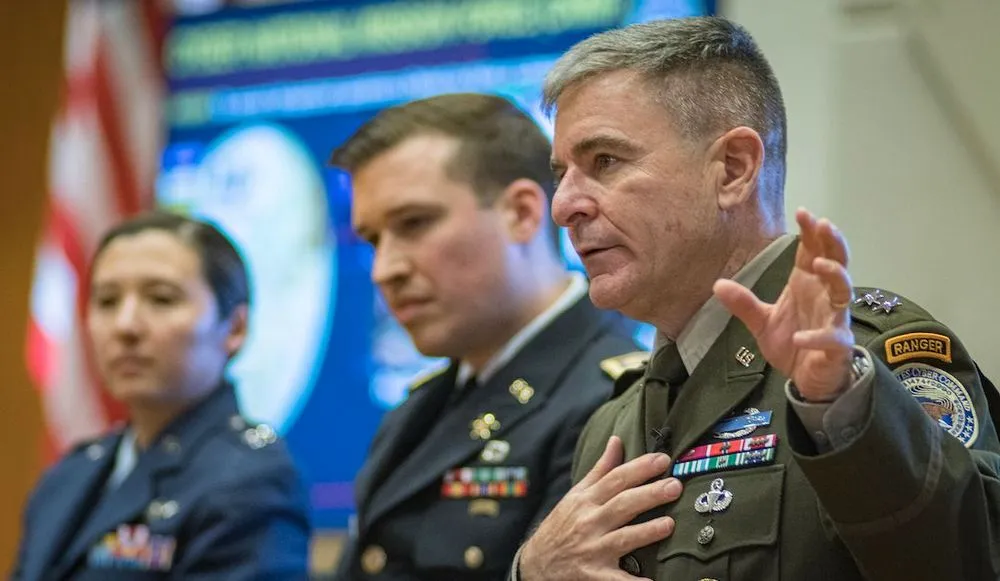White House to choose Army general to be new No. 2 at Cyber Command
Army Maj. Gen. William Hartman is President Joe Biden’s pick to be the next deputy of U.S. Cyber Command, The Record has learned, rounding out a major leadership overhaul of the military’s top digital warfighting organization.
Hartman, who has led Cyber Command’s elite Cyber National Mission Force since 2019, was nominated for his third star on Tuesday, though the congressional record doesn’t specify for which post. A congressional source confirmed that Hartman has been tapped to be the command’s new No. 2 , a promotion that has been rumored about within the command for weeks.
If confirmed by the Senate, Hartman would replace Air Force Lt. Gen. Timothy Haugh. The administration formally announced on Wednesday that Haugh is the president’s nominee to helm Cyber Command and the National Security Agency, replacing Army Gen. Paul Nakasone, who is retiring after more than five years in the dual roles.
Hartman has years of history working at Cyber Command, and with Haugh.
Prior to leading the CNMF, he served as deputy commander of Joint Force Headquarters-Cyber Army, overseeing digital teams and operations in North America, the Middle East and Africa.
He then succeeded Haugh as chief of the CNMF — first activated in 2014 and now composed of 39 joint cyber teams with over 2,000 military and civilian personnel — acting as Cyber Command’s co-lead of a joint election security task force with the NSA that worked to protect the 2020 presidential election.
Hartman publicly disclosed some of those actions against Iranian hackers last month at the RSA Conference in San Francisco.
The force was conducting a reconnaissance mission in foreign cyberspace when it detected that Pioneer Kitten, an Iran-linked hacking group, had “gained access to a city's local infrastructure that would be used to record the results of voting for the 2020 elections.”
“All I'm gonna tell you is that we were able to go out and remediate the access that they had in these networks,” Hartman told reporters.
During Hartman’s tenure, the CNMF has become central to the command’s national security portfolio and objectives, such as election security, bolstering Ukraine’s forces against Russian hackers and the ongoing battles against digital espionage and ransomware.
Underpinning all of that work has been the command’s “hunt forward” missions to study firsthand the digital tactics of foreign adversaries and obtain new malware samples. The number of such missions has bloomed in recent years, with U.S. personnel deploying to nearly two dozen countries to date, including multiple times to Ukraine.
Speaking to reporters earlier this month, Nakasone predicted the missions would ramp up as Russia’s invasion of Ukraine continues.
“I bet you there's a bigger call for that in terms of hunt forward operations,” said Nakasone, himself a former CNMF chief, adding NATO countries are working to bolster their cyber defenses.
The CNMF has become so integral to Cyber Command that late last year the Defense Secretary Lloyd Austin authorized it to become a permanent subordinate organization within the command,
Hartman’s nomination means that the command’s digital corps will also need a new chief. Sources tell The Record that Maj. Gen. Lorna Mahlock, who became the first Black female major general in the history of the Marine Corps last year, will most likely get the nod.
Mahlock, whom the sources say has the backing of Nakasone, currently serves as the deputy director for combat support for the NSA’s Cybersecurity Directorate.
A CNMF spokesperson referred a request for comment to the Defense Department. A Pentagon spokesperson declined to comment.
Martin Matishak
is the senior cybersecurity reporter for The Record. Prior to joining Recorded Future News in 2021, he spent more than five years at Politico, where he covered digital and national security developments across Capitol Hill, the Pentagon and the U.S. intelligence community. He previously was a reporter at The Hill, National Journal Group and Inside Washington Publishers.



